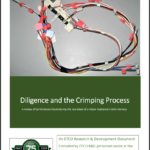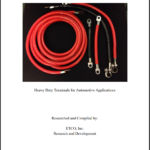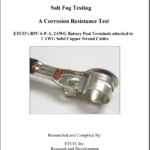Read ETCO’s White Papers and Data Sheets to discover the latest on our products and industry trends.
 As part of it’s continuous review of wiring and circuit connection methods in the appliance industry, ETCO’s Research & Development team performs teardown evaluations of major appliance manufacturer’s product offerings. One such teardown was on an electric range. The appliance was a mid-range model of the glass top
As part of it’s continuous review of wiring and circuit connection methods in the appliance industry, ETCO’s Research & Development team performs teardown evaluations of major appliance manufacturer’s product offerings. One such teardown was on an electric range. The appliance was a mid-range model of the glass top
type range/ovens and fell within the middle of all available models as far as price and features. The unit was visually examined on the exterior and energized to confirm all feature functions. Cycling all heating elements, stove top and oven for 100 hours the unit did perform as expected. It was during the inspection of the appliance’s main wire harness where the unexpected was discovered.
 Many things have to be considered when developing a terminal for heavy duty automotive applications. This report shares several concerns vital to manufacturing a robust, heavy duty automotive electrical connection that must meet or exceed customer specifications and SAE standards.
Many things have to be considered when developing a terminal for heavy duty automotive applications. This report shares several concerns vital to manufacturing a robust, heavy duty automotive electrical connection that must meet or exceed customer specifications and SAE standards.
An ETCO customer makes wire harnesses subject to rough conditions for Construction, Agricultural, Heavy Truck and Off-Road Equipment. ETCO developed a fuse clip terminal that would eliminate overheating, connection separation, and loose fuses due to truck and motor vibration.
An ETCO customer had warranty issues with locking ring terminals on large appliance ground wires. ETCO’s research team evaluated existing products, and then developed a new locking terminal and tested it against the competition. ETCO’s new product proved to have superior performance.
How do you manufacture products with ETCO for the lowest initial tooling costs, short lead times and the lowest overall production costs? The engineers at ETCO have prepared a guide that outlines all the considerations necessary in a concise 8 page pdf document.
Using these guidelines will get you optimal results when working with ETCO.
Product Considerations for Progressive Die Manufacture
To download the Product Consideration document for Die Manufacture please enter your information.
As a manufacturer of connectors, the use of product teardowns is useful in reviewing one’s own product as well as the industry into which it fits. It is important in keeping appraised of the changes in industry and the trends in technology that directly affect one’s business. These teardowns, when performed for proactive reasons, are primarily used to check the performance of a given product or its component parts. When the results of the teardowns are recorded and reviewed together, however, they can also reveal a issues or improvements worthy of attention.
R&D has been working on a Lab fixture that will trigger Coil On Plug type coils. It will use this tool to compare industry standard coil to plug connections (typically a spring) with each other, and with prototype ideas, seeking to offer a better connection. We hope to show an improved terminal design can eliminate the micro arcing that causes; noise, voltage spikes and silicone boot degradation, leading to a short. We are also building a vibration unit the Coil fixture will mount on. This will allow us to shake fixture for periods of time and evaluate effects on connections. In addition to vibration effects, we will testing for voltage drop, and resistance, between the coil and the plug.
ETCO’s Closed Back Insulated Connector was developed for use in appliance manufacturing. In conjunction with the closed back cover inserter applicator, this connector is top rated for safety and ease of use in appliance manufacturing applications.
It was reported to ETCO R&D that in the appliance industry insulated terminals were having insulator retention failures in the field. Apparently these assemblies used on major appliance wire harnesses were having issues where insulators separate from their terminals. Using select conditioning methods of MIL-STD-202G / Method 103B, ETCO tested their products against those of a major competitor.
 ETCO’s Research & Development team tested the corrosion resistance capabilities of large gauge Battery Post
ETCO’s Research & Development team tested the corrosion resistance capabilities of large gauge Battery Post
Terminal crimps when attached to copper strand conductor cables. Battery terminal attached cables were subjected
to corrosion testing in ETCO’s “salt fog” chamber for several days, with before and after visual inspections and
photo documentation. Before and after cross-sections. The process was monitored daily for corrosion progress
and was concluded at 168 hours / 7 days of exposure. Testing included terminal retension trials.